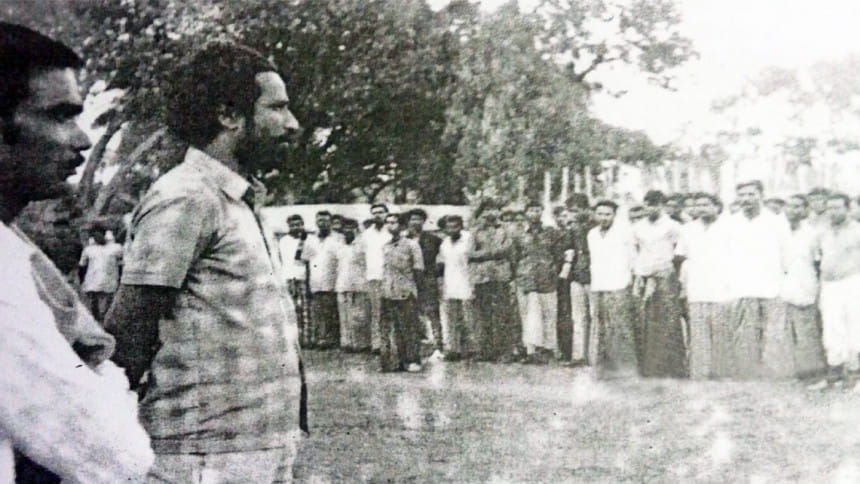The tale of "Rahmat Ali"

I am sharing this story on occasion of Amir-ul-Islam's 80th birthday, which took place on February 2. Arun Bhattacharjee, author of a 1973 Vikas publication, Dateline Mujibnagar, wrote that "the two arrived at a well-guarded guesthouse at about midnight to be received by the senior most officer of the Border Security Force (BSF). The older one of the two strangers was identified as Mohammad Ali and the younger one as Rahmat Ali."
The date was March 30, 1971. The place was Kushtia-Nadia border. It was, indeed, the maiden 'state visit' of two Alis to a foreign country as a representative of a new-born nation.
'Mohammad Ali' was Tajuddin Ahmad and 'Rahmat Ali' was Amir-ul Islam, aide to Prime Minister Tajuddin Ahmad. Though no ceremonial red carpet was rolled out for our Prime Minister and his 34-year-old aide, they were greeted "in a lantern light under a tree" at Changrakhali BOP at the border of Chuadanga by a senior BSF official namely Golok Majumder and Col Chakrobarty of the 76 Battalion.
The aforementioned narratives have been borrowed from the diary of KF Rustamji, founder DG of BSF, who was known as a shadow of Nehru and a close family friend of the Gandhis. He was the man who first established a link between our first visitors and Indira Gandhi.
The six-foot tall Rustamji jokingly recalled, "I gave them (two Alis) my kurta and pyjama to change into after having a bath. Golok made an omelette for them."
On April 1, Rustamji recalled, he and Golok went to New Market and bought clothes (including undergarments) and other accessories, such as suitcases and toiletries, for their guests. Golok remarked, "Sir, we're equipping them as if we are sending our daughter to her husband's house." Golok had used the word 'shashurbari', as Amir fondly remembers.
Amir, who has devoted his whole life to upholding the law, made the first draft of a writ challenging the legality of his own arrest at the age of 18. He began his career as a junior of Denis Nowell Pritt, a Labour politician and lawyer, who was considered an "underground communist" by George Orwell. A few years later, Amir associated himself with a London-based study group, Purboshuri, which published an article called "Unhappy East Pakistan" that reflected on the quest for freedom. As the first Bangali president (defeating Faruk leghari who later became President of Pakistan) of London-based Pakistan Student Federation, he developed a personal friendship with West Pakistani intellectuals (such as economist Hamza Alvi and Shafqat Ullah Qadri QC) along with British MPs like Peter Shore and John Stonehouse who later gave their support to our Liberation War.
He returned to Dhaka in 1963. He came in close contact with Suhrawardy and Bangabandhu Sheikh Mujibur Rahman during the United Front elections of 1954. Upon his return from London, Mujib then asked him to help him reenergise the party. He was instrumental in unearthing the Agartala conspiracy by initiating a baffling torture case, when no one knew about this. He passed the message to Bangabandhu and to his contacts in London and acted promptly to defend the accused by engaging Tom Williams QC to lead the defence team.
While in imprisonment (for two years), he refused to give a bond as proposed by the government to his father. Even when he lost his citizenship for engaging in the anti-Ayub movement, he refused the offer to get a British passport. In 1962, he received a letter from Ayub Khan which asked him to dissuade the 'bad hats' from indulging in anti-state activities, a letter that he neither responded to nor acknowledged.
Amir has tried his best to jealously guard his Ameership throughout his chequered career especially in our struggle for freedom.
He won his first legal battle challenging the expulsion of DU students (Minister Rashed Khan Menon and two late High Court judges were among the expelled), which re-established the age old maxim — principles of natural justice — in this part of the world.
One of our leading framers of the Constitution, he single-handedly drafted Article 11 that defines democracy as 'respect for the dignity'. He envisioned an administration that, from top to bottom, would be run only by people's representatives under all circumstances. It was his dream to administer some core state affairs such as regulating public officials, controlling public order and turning Bangladesh's 'administrative units' into autonomous bodies. ''I meant to make the districts & thanas into 'little republics'," he once told me.
It was, indeed, a compromise to adopt the unitary-form based on large concentration of power, giving up the federal structure that had been a demand in the historic 6-point charter. Thus Amir devised a new chapter "Local Government" by incorporating Articles 59 and 60 in the Constitution of 1972 for the sake of decentralisation. This scheme had no other comparison in the region or any other commonwealth countries.
If we sum up his anti-militaristic venture from the Agartala conspiracy case to the 5th amendment case, we can reach the conclusion that he is a torchbearer of establishing elected regimes committed to "human dignity and social justice" (as he brilliantly coined in our proclamation of independence). He believes in political dissent and abstained from a parliamentary meeting regarding the second amendment that introduced emergency laws. He was reminded of the prohibition of Article 70 but he politely defended his position to Bangabandhu and he was exonerated.
Now it is the duty of the new generation to make a fresh oath to realise the unfulfilled dreams of Amir-ul-Islam. I wish him a longer life and good health.
The writer is Joint Editor of Prothom Alo.

 For all latest news, follow The Daily Star's Google News channel.
For all latest news, follow The Daily Star's Google News channel. 



Comments